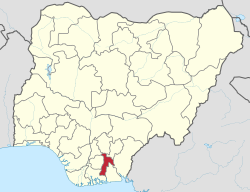Abia (state)
| Abia | ||
|---|---|---|
| State | ||

Abia Tower in Umuahia
|
||
|
||
| Nickname(s): God's Own State Igbo:Ọ̀hà Chineke |
||
 Location of Abia State in Nigeria |
||
| Coordinates: 5°25′N 7°30′E / 5.417°N 7.500°ECoordinates: 5°25′N 7°30′E / 5.417°N 7.500°E | ||
| Country |
|
|
| Date created | 27 August 1991 | |
| Capital | Umuahia | |
| Government | ||
| • Governor | Okezie Ikpeazu (PDP) | |
| • Deputy Governor | Ude Okochukwu (PDP) | |
| • Senators | Eyinnaya Abaribe Theodore A. Orji Mao Ohuabunwa |
|
| • Representatives | List | |
| Area | ||
| • Total | 6,320 km2 (2,440 sq mi) | |
| Population (2006 census) | ||
| • Total | 2,833,999 | |
| • Density | 450/km2 (1,200/sq mi) | |
| Demonym(s) | Abian | |
| GDP (PPP) | ||
| • Year | 2007 | |
| • Total | $18.69 billion | |
| • Per capita | $3,003 | |
| Time zone | WAT (UTC+01) | |
| ISO 3166 code | NG-AB | |
| Official language | English | |
| Website | abiastate.gov.ng | |
Abia is a state in the south eastern part of Nigeria. The capital is Umuahia and the major commercial city is Aba. The commercial hub, Aba was formerly a British colonial government outpost in the region. Abia state was created in 1991 from part of Imo State. It is one of the constituent states of the Niger Delta region.
Abia State, which occupies about 6,320 square kilometres, is bounded on the north and northeast by the states of Anambra, Enugu, and Ebonyi. To the west of Abia is Imo State, to the east and southeast are Cross River State and Akwa Ibom State, and to the south is Rivers State. The southern part of the State lies within the riverine part of Nigeria. It is low-lying tropical rain forest with some oil-palm brush. the southern portion gets heavy rainfall of about 2,400 millimetres (94 in) per year especially intense between the months of April through October. The rest of the State is moderately high plain and wooded savanna. The most important rivers in Abia State are the Imo and Aba Rivers which flow into the Atlantic Ocean through Akwa Ibom State.
Crude oil and gas production is a prominent activity, as it contributes over 39% of the State's GDP. However, the Indigenous oil companies, through the Marginal Fields Programme (MFP) have not found it easy to attract the requisite funding and infrastructural capacity to explore some of the marginal oil fields, about 50 in the State.
...
Wikipedia

